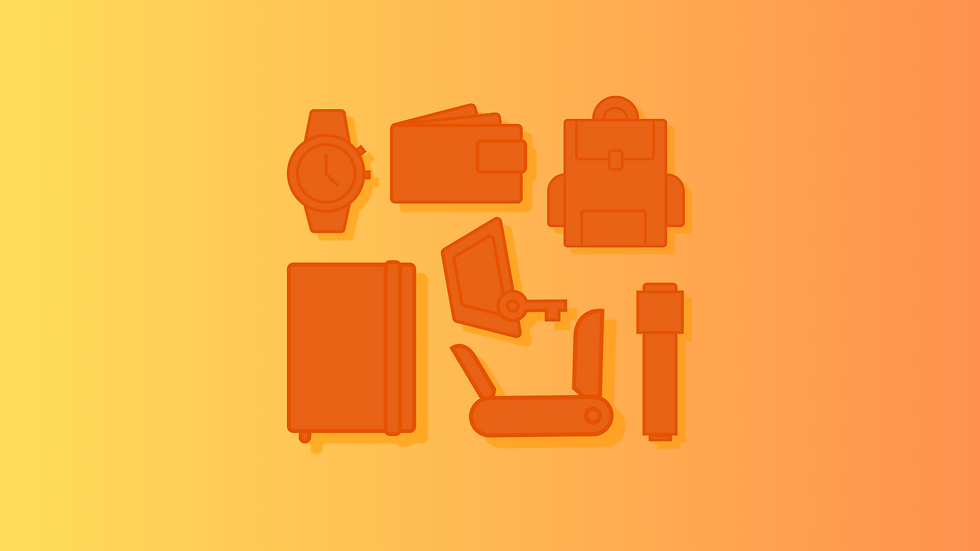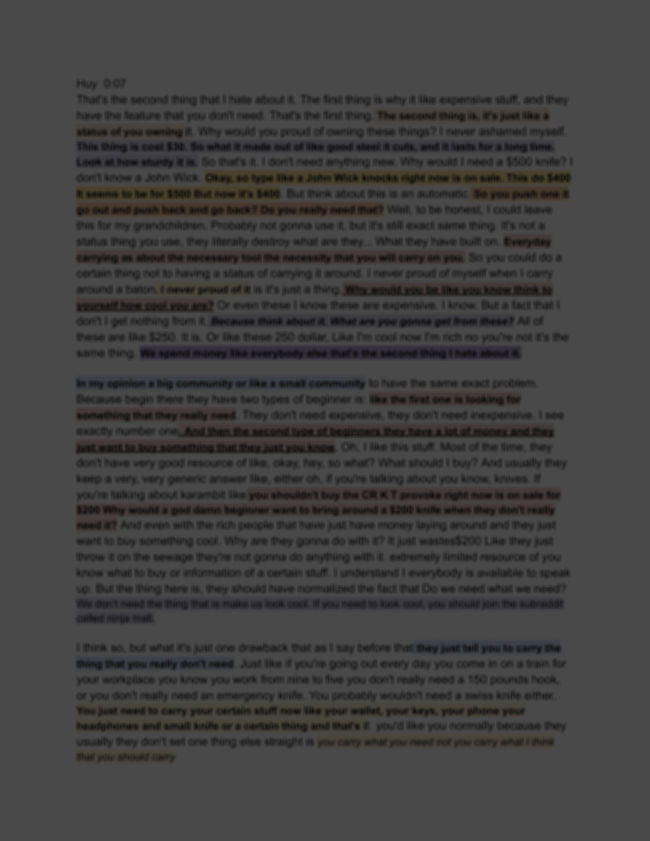producing Immersive Experiences for Good

Everyday
Carry
Community
Discovering the day in the life of Everyday Carry enthusiasts through netnography, empathy interviews, and the qualitative research process.
Team
Phoebe Lin
Artemis Feng
Skills
Experience Design, Leadership, Quantitative Research, User Interviews, Interaction Design, Visual Design, Concepting
Timeline
January 2023 - April 2023
Overview
I immersed myself into a fandom of interest to learn how to create immersive experiences based on a strategic qualitative research process. The audience is a core part of my creative process to humanize technology in ALL of my projects.
RESEARCH PLAN
1. I created an initial definition of the Everyday Carry (EDC) Community through researching archived data in an initial scour of existing articles, forums, and videos.
2. We developed a interview protocol and Artemis assisted in writing detailed followup questions that helped the follow of conversation in our empathy interviews.
3. I organized remote collaboration milestones and a timeline to organize the process.
KEY INITIAL QUESTIONS
How has your typical day changed since you joined the community?
Do you have any other hobbies or collections other than EDC?
Is there anything else you want to add that we haven't talked about?
What do you think first sparked your interested in this community? What advice would you give you a beginner in the community? Imagine you're giving advice to your mother who just joined the community spaces, what would you advise her to avoid?
For women of EDC, could you tell me the story of a key experience, as someone who isn't a man, in this seemingly male dominated fandom?
Netnography
We recorded field notes by participating in the community with EDC's top collectors and creators by joining popular EDC platforms such as...
Spyderco Forums where the enjoyers of the EDC world's most trusted brand converge.
Reddit: r/edc, r/knifeswap, etc. has diverse community conversations where we picked up the lingo, like "slicey", "mall ninja", and "pocket check."
Discord: Zencron INC. is a lively online business and private micro-community by a local friendly EDC-er, Zen Lee, who has been vital in understanding the community he loves so much.




We met with EDC influencers like Brian Kim and Lyndy Lou who happily joined our research discussions through our empathy interviews.

Empathy Interviews
In our series of 7 interviews with local EDC-ers, influencers, first responders, and top creators, was then transcribed and coded to identify pain points, key values, and emotions associated with the Everyday Carry Community. This made up our elicited data.

Personas
After four weeks of research, I wrote a report of our cases studies and set a visual style guide for my teammate to illustrate the two key personas: The Outdoorsman & The Techie.
Blue sky / guest experience
In the vast constellation that is the EDC community, our findings yielded that, between the personas who valued usability and those who valued aesthetics, they share one key pain point: EDC-ers couldn't find their people. We were challenged to design an interactive experience to encourage our audience to "find their people" by increasing the connectivity and visibility of EDC "micro-communities" which has close-knitness the mainstream platforms don't offer.
Value Map
_edited.jpg)
Utilizing this value map, we translated our qualitative research data into tangible experiences that the community needs and wants. Over the course of 2 weeks, we ideated and developed a concept for Pocket Show, an accessible in-person event for EDC-ers to meet at different locations locally across the globe.
Not only is this pop-up event more accessible than the existing annual EDC shows that take place all the way in Atlanta, it has a social AR digital component which we demoed in Figma, inviting EDC-ers to stay connected to those they meet at the Pocket Show even after the show has packed up.
Reflection
Mock client CRitiques & Design Challenges.
As part of the Audience Development & Engagement course, we pitched our research findings and the guest experience to Erin Reilly, founder of the Texas Immersive Institute and David Weiss, Owner and Creative Director at Flying Doghouse Productions for critique and feedback.
Our research findings for the Everyday Carry Community received a round of applause and even garnered personal interest in the community from the class.
"I just learned about a new community today."
- David Weiss, Flying Doghouse Productions
More of the critiques was on the guest experience, with the strengths of our deliverable being in the accessible model of local pop-up shows which is what the community lacks. However here were some design flaws to keep in mind for next time.
-
User flow clarifications: We needed to clarify the open floor plan that while users are at the event they may flow between the specialities booths and the Pocket Projection Booths.
-
Mobile site confusion: We also needed to clarify what the Pocket Projection mobile site was used by users to scan the name tags of other EDC-ers that they meet to access personal EDC story that they recorded at the Pocket Projection Booth.
-
Pocket "Projections": Clients found the naming is confusing as it was not actually a projection, but an WebAR visualization of 3D model scans of tools that EDC-ers brought to the event.
Clients were more interested in the sensory pocket projection booths, and classmates suggested that the pop-up events can even be simplied to just the sensory storytelling booths, as "they are very hot right now," according to Erin.
Overall, I found the audience research experience one I would bring to all of my creative projects, and the guest experience design to be a good exploration into the affordances of physical immersive events as I've only specialized in digital experiences up until now!
collaboration.
The organization of this project was challenging and unique in that this project assignment was originally designed for a team of 3 to 4 student designers while I was on a team of 2. Because of this I've accommodated and provided mentorshop my teammate, who was still in the process of learning many of the skills this project required, throughout the entire project. I can appreciate the willingness to grow and availability of my teammate to always be available throughout both in-person and remote collaboration. In retrospect, this was a valuable learning experience in both team leadership and a positive reinforcement based communication style which will be vital in leading any creative project in the future.